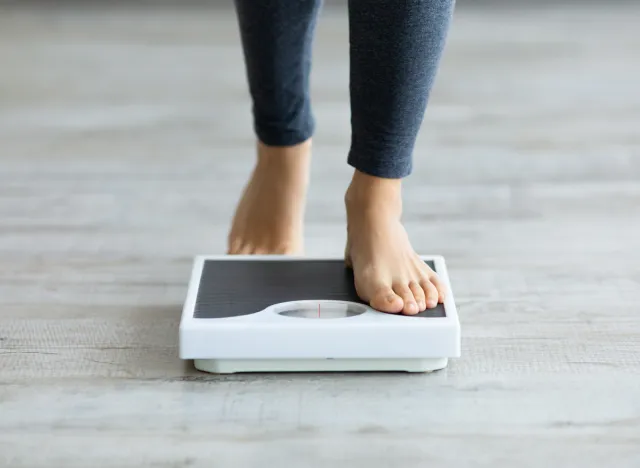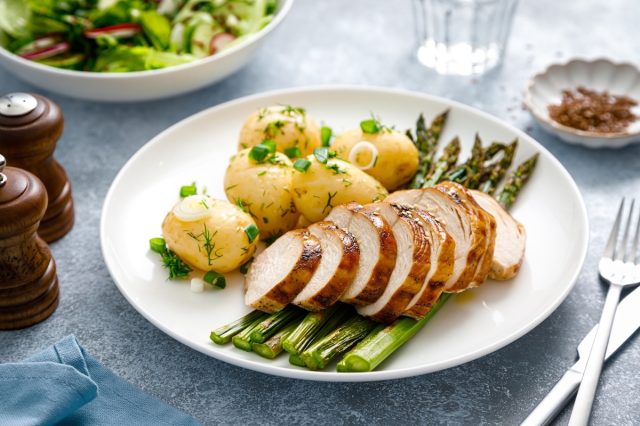What Happens to Your Body When You Eat 100 Grams of Protein a Day?

Protein is often touted as the essential nutrient for building muscle, shedding fat, and boosting your immune health. But how much protein do you really need? The general recommendation for the average adult is around 0.8 grams of protein per kilogram of body weight, but for those looking to build muscle, lose fat, or speed up their metabolism, research says increasing your protein intake to 1.6 to 2.2 grams can be a game-changer.
Whether you're a weekend warrior, trying to lose weight, or simply wanting to improve your health, eating 100 grams of protein a day can help. But what happens to your body when you meet this daily target? To find out, we chatted with Trista Best, RD, a registered dietitian with Balance One Supplements, who shares expert insights as to what happens to your body when you eat 100 grams of protein a day regularly. Read on to find out. And, when you're done, check out these 10 Warning Signs You're Not Eating Enough Protein.
Protein Supports Muscle Growth and Repair

It's no secret that protein supports muscle growth and repair. Consuming 100 grams of protein a day helps supply the amino acids (building blocks of protein) needed for muscle protein synthesis (MPS), which is the process your body uses to repair and build muscle tissue after exercise.
"Protein intake plays a crucial role in muscle growth, metabolism, and fat loss," Best says. "It provides the essential amino acids needed for muscle protein synthesis, which helps repair and build muscle tissue, especially after exercise."
Protein Boosts Your Metabolism

According to a recent review published in Advances in Nutrition, protein has a higher thermic effect than carbohydrates and fats, meaning your body burns more calories to digest and absorb protein compared to other macronutrients.
"Protein plays a key role in metabolism, as the body burns more calories digesting protein compared to fats and carbohydrates," Best tells us. "The process of digesting protein requires more energy, which can help increase overall calorie expenditure, ultimately supporting fat loss."
Protein Preserves Muscle Mass While Losing Fat

Research shows that protein helps prevent muscle breakdown, especially during periods of weight loss. When your body is in a calorie deficit, it's at risk of breaking down muscle tissue for energy. But with enough protein, your body is less likely to turn to muscle for fuel, as it has the necessary amino acids to protect your lean tissue.
"Protein helps preserve lean muscle mass during fat loss, reducing the risk of metabolic slowdown," Best explains. "This is important because muscle mass burns more calories at rest than fat tissue. So, the more muscle you maintain, the higher your resting metabolic rate becomes, making it easier to lose fat and keep it off."
Additionally, studies have found that protein also helps regulate your appetite by helping you feel fuller for longer. This can be especially helpful when trying to manage a calorie deficit without feeling hungry all the time.
What About Protein Sources?

Not all protein sources are created equal. If you want to hit 100 grams a day, make sure they come from various high-quality sources that balance all nine essential amino acids, which you need to get through food as your body can't produce them on its own.
For animal-based protein sources, lean meats like chicken breast, turkey, and fish are excellent options since they're complete proteins with all the essential amino acids your body needs. Greek yogurt, eggs, and cottage cheese are other nutrient-dense options that pack a protein punch.
Plant-based proteins like tofu, tempeh, lentils, chickpeas, quinoa, seitan, and edamame deliver plenty of protein while also providing fiber and essential nutrients.
Best recommends a mix of both animal and plant-based proteins for optimal health, saying, "To meet 100 grams efficiently, a combination of animal and plant proteins, along with balanced meals and snacks, is ideal."
If you're pressed for time or need a quick protein boost after a workout, studies suggest supplementing with protein powders as a convenient way to increase your protein intake.
Spreading Protein Intake Throughout the Day Improves Absorption

According to a 2018 study published in the Journal of the International Society of Sports Nutrition, your body can only absorb so much protein at one time, typically around 20 to 40 grams per meal. So, rather than consuming all your protein in one go, spread it out across the day in three to four equal servings.
"Protein absorption is influenced by meal timing, food combinations, and overall daily intake," Best explains. "Spreading protein intake evenly throughout the day, rather than consuming most of it in one meal, optimizes muscle repair and growth."
Wrapping It Up
Eating 100 grams of protein a day offers many health benefits, including muscle growth, increased satiety, better metabolism, and improved immune function. Making sure you get enough protein every day can help you recover faster from workouts, hold on to lean muscle mass, and maintain a healthy metabolism as you age. While the ideal sources of protein will depend on your dietary preferences and needs, getting enough protein throughout the day is crucial for achieving your health and fitness goals. Consult your healthcare provider or a registered dietitian if you have any questions about how to boost your protein intake for optimal health.









